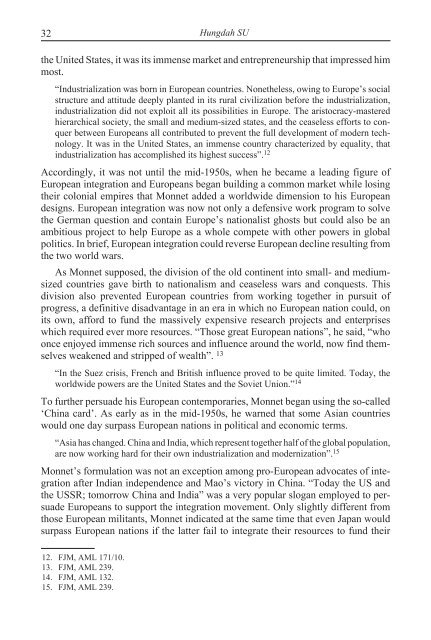Journal of European Integration History - Centre d'études et de ...
Journal of European Integration History - Centre d'études et de ...
Journal of European Integration History - Centre d'études et de ...
You also want an ePaper? Increase the reach of your titles
YUMPU automatically turns print PDFs into web optimized ePapers that Google loves.
32<br />
the United States, it was its immense mark<strong>et</strong> and entrepreneurship that impressed him<br />
most.<br />
“Industrialization was born in <strong>European</strong> countries. Non<strong>et</strong>heless, owing to Europe’s social<br />
structure and attitu<strong>de</strong> <strong>de</strong>eply planted in its rural civilization before the industrialization,<br />
industrialization did not exploit all its possibilities in Europe. The aristocracy-mastered<br />
hierarchical soci<strong>et</strong>y, the small and medium-sized states, and the ceaseless efforts to conquer<br />
b<strong>et</strong>ween <strong>European</strong>s all contributed to prevent the full <strong>de</strong>velopment <strong>of</strong> mo<strong>de</strong>rn technology.<br />
It was in the United States, an immense country characterized by equality, that<br />
industrialization has accomplished its highest success”. 12<br />
Accordingly, it was not until the mid-1950s, when he became a leading figure <strong>of</strong><br />
<strong>European</strong> integration and <strong>European</strong>s began building a common mark<strong>et</strong> while losing<br />
their colonial empires that Monn<strong>et</strong> ad<strong>de</strong>d a worldwi<strong>de</strong> dimension to his <strong>European</strong><br />
<strong>de</strong>signs. <strong>European</strong> integration was now not only a <strong>de</strong>fensive work program to solve<br />
the German question and contain Europe’s nationalist ghosts but could also be an<br />
ambitious project to help Europe as a whole comp<strong>et</strong>e with other powers in global<br />
politics. In brief, <strong>European</strong> integration could reverse <strong>European</strong> <strong>de</strong>cline resulting from<br />
the two world wars.<br />
As Monn<strong>et</strong> supposed, the division <strong>of</strong> the old continent into small- and mediumsized<br />
countries gave birth to nationalism and ceaseless wars and conquests. This<br />
division also prevented <strong>European</strong> countries from working tog<strong>et</strong>her in pursuit <strong>of</strong><br />
progress, a <strong>de</strong>finitive disadvantage in an era in which no <strong>European</strong> nation could, on<br />
its own, afford to fund the massively expensive research projects and enterprises<br />
which required ever more resources. “Those great <strong>European</strong> nations”, he said, “who<br />
once enjoyed immense rich sources and influence around the world, now find themselves<br />
weakened and stripped <strong>of</strong> wealth”. 13<br />
“In the Suez crisis, French and British influence proved to be quite limited. Today, the<br />
worldwi<strong>de</strong> powers are the United States and the Sovi<strong>et</strong> Union.” 14<br />
To further persua<strong>de</strong> his <strong>European</strong> contemporaries, Monn<strong>et</strong> began using the so-called<br />
‘China card’. As early as in the mid-1950s, he warned that some Asian countries<br />
would one day surpass <strong>European</strong> nations in political and economic terms.<br />
“Asia has changed. China and India, which represent tog<strong>et</strong>her half <strong>of</strong> the global population,<br />
are now working hard for their own industrialization and mo<strong>de</strong>rnization”. 15<br />
Monn<strong>et</strong>’s formulation was not an exception among pro-<strong>European</strong> advocates <strong>of</strong> integration<br />
after Indian in<strong>de</strong>pen<strong>de</strong>nce and Mao’s victory in China. “Today the US and<br />
the USSR; tomorrow China and India” was a very popular slogan employed to persua<strong>de</strong><br />
<strong>European</strong>s to support the integration movement. Only slightly different from<br />
those <strong>European</strong> militants, Monn<strong>et</strong> indicated at the same time that even Japan would<br />
surpass <strong>European</strong> nations if the latter fail to integrate their resources to fund their<br />
12. FJM, AML 171/10.<br />
13. FJM, AML 239.<br />
14. FJM, AML 132.<br />
15. FJM, AML 239.<br />
Hungdah SU

















